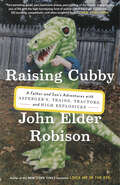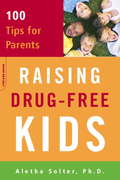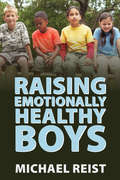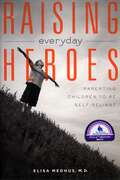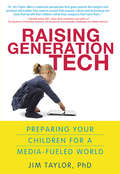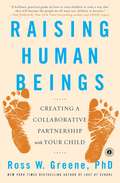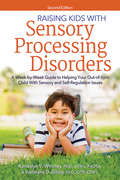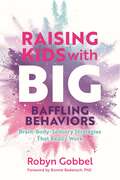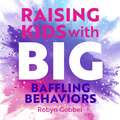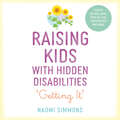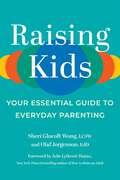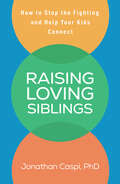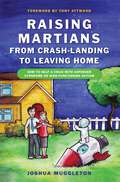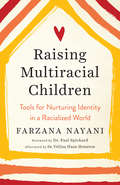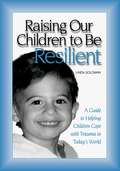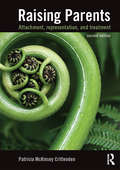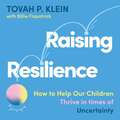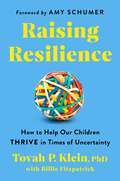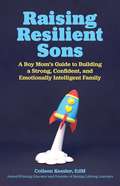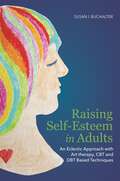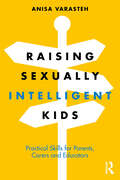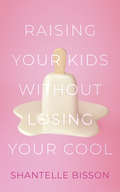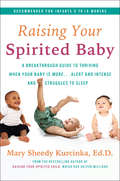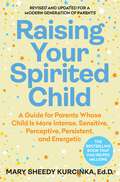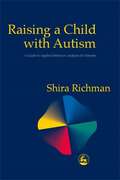- Table View
- List View
Raising Cubby: A Father and Son's Adventures with Asperger's, Trains, Tractors, and High Explosives
by John Elder RobisonThe slyly funny, sweetly moving memoir of an unconventional dad's relationship with his equally offbeat son--complete with fast cars, tall tales, homemade explosives, and a whole lot of fun and trouble John Robison was not your typical dad. Diagnosed with Asperger's syndrome at the age of forty, he approached fatherhood as a series of logic puzzles and practical jokes. Instead of a speech about the birds and the bees, he told his son, Cubby, that he'd bought him at the Kid Store--and that the salesman had cheated him by promising Cubby would "do all chores." While other parents played catch with their kids, John taught Cubby to drive the family's antique Rolls-Royce. Still, Cubby seemed to be turning out pretty well, at least until school authorities decided that he was dumb and stubborn--the very same thing John had been told as a child. Did Cubby have Asperger's too? The answer was unclear. One thing was clear, though: By the time he turned seventeen, Cubby had become a brilliant and curious chemist--smart enough to make military-grade explosives and bring federal agents calling. With Cubby facing a felony trial--and up to sixty years in prison--both father and son were forced to take stock of their lives, finally accepting that being "on the spectrum" is both a challenge and a unique gift.nd a bracing lack of sentimentality." --Entertainment Weekly"Endearing...Robison is a natural storyteller." --Boston Globe
Raising Drug-Free Kids: 100 Tips for Parents
by Aletha SolterAdding to the successful series of "Raising" titles, a developmental psychologist gives parents tips for keeping children of all ages away from drugs and alcohol
Raising Emotionally Healthy Boys
by Michael ReistRaising emotionally healthy children is not just about what we need to do, but what we need to avoid doing. We all know that repressing our feelings can be damaging, and that emotional repression is an especially prevalent issue among males. From a very young age, boys are socialized to hide their emotions. Girls, on the other hand, are encouraged to learn a much broader range of emotional expression. The long-term repercussions of this imbalance are profound. Many of the problems we face, both as a society and as a species, are directly affected by how we raise our boys. We are all products of nature and nurture combined. The conscious and unconscious lessons we give our children often enhance and improve their human natures, but can sometimes degrade them, too. As we come to the end of thousands of years of patriarchy, we are being challenged to redefine masculinity. Our boys are lucky to be living in such a time, and luckier when they have adults in their lives who are aware of how their minds function and what they need. If we want to raise men who are strong, confident, and whole in the best sense of these words, then parents around the world urgently need a conversation about what we teach — and don’t teach — our boys.
Raising Everyday Heroes
by Elisa MedhusMany parents go to great lengths to protect their children from dangerous influences, boredom, want, and even the consequences of the kids' own choices, but Elisa Medhus believes this doesn't allow kids to develop the skills they need to be successful adults. She tells readers how to give their children opportunities to overcome adversity while still in a loving family environment, so the can develop internal wisdom, creative problem-solving skills, and basic common sense.
Raising Generation Tech
by Jim TaylorToday's children are being raised as ‘digital natives' in a world dominated by popular culture and technology. TV shows, computers, video games, social networking sites, advertisements, and cell phones too often have an unnecessarily strong-and negative#150; influence on children. But pulling the plug just isn't an option in a world where being connected is essential for success. In Raising Generation Tech, noted parenting expert Dr. Jim Taylor explores how popular culture and technology shape children's lives. The essential message from Raising Generation Tech is that excessive or unguided exposure to popular culture and technology is not good for children. Rather than offering the usual ‘end of days' scenario, Dr. Taylor offers a balanced and optimistic perspective that offers parents insights and practical information they need to ensure that popular culture and technology are tools that benefit their children rather than weapons that hurt them. Six Messages FromRaising Generation Tech: Popular culture may be the powerful influence on children today and most of that influence is not healthy to children. Children are being exposed to technology earlier than ever without proper limits or guidance. Excessive exposure to popular culture and technology has been linked to many childhood problems including shorter attention spans, lower grades in school, increased sexual activity and drug use, and obesity. Too early and unguided immersion in popular culture and technology will actually hinder rather than better prepare children for life in the digital world. Key areas in which parents should focus their child-rearing attention include their children's self-identity, values, thinking, relationships, and physical and mental health. The goal for parents is not to disconnect their children, but rather to expose them to popular culture and technology when they are developmentally ready and then give them the perspectives, attitudes, and tools they need to thrive in this digital age.
Raising Human Beings: Creating a Collaborative Partnership with Your Child
by Ross W. GreeneRenowned child psychologist and New York Times bestselling author of Lost at School and The Explosive Child explains how to cultivate a better parent-child relationship while also nurturing empathy, honesty, resilience, and independence.Parents have an important task: figure out who their child is—his or her skills, preferences, beliefs, values, personality traits, goals, and direction—get comfortable with it, and then help them pursue and live a life according to it. Yet parents also want their kids to be independent, but not if they are going to make bad choices. They want to avoid being too overbearing, but not if an apathetic kid is what they have to show for it. They want to have a good relationship with their kids, but not if that means being a pushover. They don’t want to scream, but they do want to be heard. Good parenting is about striking the balance between a child’s characteristics and a parent’s desire to have influence. Dr. Ross Greene “makes a powerful case for rethinking typical approaches to parenting and disciplining children” (The Atlantic). Through his well-known model of solving problems collaboratively, parents can forgo timeout and sticker charts; stop badgering, berating, threatening, and punishing; allow their kids to feel heard and validated; and have influence. From homework to hygiene, curfews, to screen time, Dr. Greene “arms parents with guidelines that are clear, doable, and sure to empower both parents and their children” (Adele Faber, coauthor of How to Talk So Kids Will Listen). Raising Human Beings is “inspirational…a game-changer for parents, teachers, and other caregivers. Its advice is reasonable and empathetic, and readers will feel ready to start creating a better relationship with the children in their lives” (Publishers Weekly, starred review).
Raising Kids With Sensory Processing Disorders: A Week-by-Week Guide to Helping Your Out-of-Sync Child With Sensory and Self-Regulation Issues
by Rondalyn Whitney Varleisha GibbsTaking a look at the most common sensory issues kids face, Raising Kids With Sensory Processing Disorders offers a compilation of unique, proven strategies that parents can implement to help their children move beyond their sensory needs. This updated second edition:Shows parents how to characterize their child's sensory issues into one of several profiles.Helps parents find the best adaptations and changes to their child's everyday routines.Provides a week-by-week series of activities and checklists.Helps improve children's performance on tasks like homework, transitions between activities, and interactions with friends.Is written by parents and occupational therapists.Whether it's having to remove tags from clothing or using special dimmed lighting when they study, kids with sensory disorders or special sensory needs often need adaptations in their everyday lives in order to find success in school and beyond.
Raising Kids with Big, Baffling Behaviors: Brain-Body-Sensory Strategies That Really Work
by Robyn Gobbel"All behavior makes sense"'"It most certainly does not!", is probably your first reaction.Parenting and neuroscience expert Robyn Gobbel is here to reveal how all behavior, no matter how baffling, can be explained and remedied. You just need to look past the behavior and understand what's going on inside.Robyn decodes the latest brain science into easy-to-understand principles and metaphors to help you become an expert in your child's behavior. She reveals simple ways to help you regulate and connect with your child, with brain-, body- and sensory-based strategies to overcome day-to-day challenges. She also provides you with the knowledge to understand and regulate your own brain so that you don't flip your lid when your child flips theirs.Let this be your lifeline for parenting or caring for any child with baffling behaviors and hidden challenges, including kids who have experienced adversity, or with additional needs.
Raising Kids with Big, Baffling Behaviors: Brain-Body-Sensory Strategies That Really Work
by Robyn Gobbel"All behavior makes sense"'"It most certainly does not!", is probably your first reaction.Parenting and neuroscience expert Robyn Gobbel is here to reveal how all behavior, no matter how baffling, can be explained and remedied. You just need to look past the behavior and understand what's going on inside.Robyn decodes the latest brain science into easy-to-understand principles and metaphors to help you become an expert in your child's behavior. She reveals simple ways to help you regulate and connect with your child, with brain-, body- and sensory-based strategies to overcome day-to-day challenges. She also provides you with the knowledge to understand and regulate your own brain so that you don't flip your lid when your child flips theirs.Let this be your lifeline for parenting or caring for any child with baffling behaviors and hidden challenges, including kids who have experienced adversity, or with additional needs.
Raising Kids with Hidden Disabilities: Getting It
by Naomi SimmonsA reassuring and relatable guide for parents of children with a hidden disability, including autism, ADHD, bipolar and OCD.When it comes to parenting a child with a hidden disability, everyone seems to have an opinion. Here, Naomi Simmons writes from experience, offering new solutions for when conventional parenting strategies just don't work.Whether it be high functioning autism, ADHD, OCD, a mood or anxiety disorder with or without a diagnosis, if you have a child with any hidden disability, this is the audiobook for you. Naomi Simmons is a parent of children with a range of hidden disabilities. She provides candid guidance on how best to support children in this situation - dealing with meltdowns, school avoidance, self-harm, anxiety and depression - and shares the experiences of others who really do 'get it'. Addressing common concerns and hurdles, this audiobook helps you respond to your child's needs and challenges while developing their unique strengths and talents.(P) 2022 Jessica Kingsley Publishers
Raising Kids: Your Essential Guide to Everyday Parenting
by Olaf Jorgenson Sheri Glucoft WongIn Raising Kids, family therapist and parent educator Sheri Glucoft Wong and Silicon Valley private school head Olaf Jorgenson team up to deliver a down-to-earth guide to parenting that is as encouraging as it is illuminating. With its easy-to-grasp language and tools, Raising Kids is there for you, from managing family routines, screen time, and homework, to supporting friendships, self-esteem, and resilience. You&’ll find out how being &“on your spot&” leads to fewer conflicts and replaces threats, nagging, and punishment with clear, effective messages that make sense to your kids. The authors focus on everyday parenting because how we relate to our children day-to-day forms their sense of themselves, their connection to us, and their ways of being in the world. No interaction we have with our kids is too small to strengthen our bond with them, impart our values, build their confidence, and to demonstrate communicating, relating, and caring. You&’ll learn how to be on your kids&’ side and get them on yours as you navigate daily life. Thousands of parents with toddlers through adolescents have benefited from the wisdom and reassurance that is now available in this straightforward guide. Along with offering approaches to address the challenges, Raising Kids shows you how to build on what you&’re already doing well to maximize the good times in your family life today and in the years ahead.
Raising Loving Siblings: How to Stop the Fighting and Help Your Kids Connect
by Jonathan Caspi&“Be nice to your sister!&” &“Stop picking on your brother!&” &“That's a time-out for both of you." When nothing works to stop the incessant battles, where can exhausted parents turn? Sibling expert and family therapist Jonathan Caspi knows that understanding why kids fight is the first essential step to restoring peace. Featuring clear principles, dos and don'ts, and loads of stories, this book shines a spotlight on family dynamics. Dr. Caspi guides you to make an effective plan for managing conflicts, so you can keep a cool head in the heat of the moment. Learn why it's never helpful to compare kids to each other, how to quell sibling struggles without taking sides, when to intervene (and when to step back), and what to do when parents aren't on the same page. Improving sibling relationships can have lifelong benefits for your family. This compassionate book shows how.
Raising Martians - from Crash-landing to Leaving Home: How to Help a Child with Asperger Syndrome or High-functioning Autism
by Tony Attwood Joshua MuggletonJoshua Muggleton knows from personal experience what it is like to grow up feeling like 'a Martian marooned on planet Earth'. Now 22 and studying psychology at the University of St. Andrews, he combines his insights into what it means to have Asperger Syndrome (AS) with his scientific knowledge of the autism spectrum to write an invaluable guide for parents and teachers. Opening with the very basics of what autism is, Joshua covers mental health, sensory issues, obsessions and rituals, friendships and social situations, and shopping, travelling, and holidays, before tackling what is arguably the biggest challenge of any Aspie child's life: school - and with it, bullying, homework, and other challenges. Providing the inside track on Asperger Syndrome in childhood, he describes practical ways in which parents and teachers can help, and offers a wealth of advice and helpful hints and tips for approaching common difficulties. An essential guide for any parent or teacher wishing to understand and help a child with Asperger Syndrome or high-functioning autism, Raising Martians will take them from crash-landing to leaving home.
Raising Multiracial Children: Tools for Nurturing Identity in a Racialized World
by Farzana NayaniThe essential guide to parenting multiracial and multiethnic children of all ages and learning to support and celebrate their multiracial identitiesIn a world where people are more likely to proclaim color-blindness than talk openly about race, how can we truly value, support, and celebrate our kids' identities? How can we assess our own sense of Racial Dialogue Readiness and develop a deeper understanding of the issues facing multiracial children today?Raising Multiracial Children gives caregivers the tools for exploring race with their children, offering practical guidance on how to initiate conversations; consciously foster racial identity development; discuss issues like microaggressions, intersectionality, and privilege; and intentionally cultivate a sense of belonging. It provides an overview of key issues and current topics relevant to raising multiracial children and offers strategies and developmentally appropriate milestones from infancy through adulthood. The book ends with resources and references for further learning and exploration.
Raising Our Children to Be Resilient: A Guide to Helping Children Cope with Trauma in Today's World
by Linda GoldmanIn this timely and much-needed book, Linda Goldman addresses the many frightening events that impact our children by providing the reader with a seamless mixture of theory and practice garnered from her extensive experience in the field. Raising Our Children to Be Resilient includes trauma resolution techniques and case studies, discussions of the respective roles played by parents, teachers and the larger community as well as additional resources for those in a position to help children who have been traumatized. The goal of Raising Our Children to Be Resilient is exactly what its title promises: to help children through their pain and confusion and guide them into a flexible and compassionate adulthood.
Raising Parents: Attachment, Representation, and Treatment
by Patricia M. CrittendenHelping troubled parents to raise their children adequately is of crucial importance for parents, their children and society at large. Distressed parents have themselves often been endangered and, as a consequence, sometimes endanger their children either through maltreatment or through the effects of parental psychiatric disorder. Raising Parents explains how that happens and clusters parents in terms of the psychological processes that result in maladaptive childrearing. The book then delineates DMM Integrative Treatment in terms of assessment, formulation, and treatment. New formulations are offered for problems that have resisted treatment and cases demonstrate how the ideas can be applied in real treatment settings. The book closes with 10 suggestions for improving professionals’ responses to troubled families and endangered children. This edition of Raising Parents introduces DMM Integrative Treatment and demonstrates how to use it with vulnerable families. DMM Integrative Treatment is an interpersonal process and this book will be essential reading for clinicians from all disciplines, including psychiatry and psychology, social work, nursing and all types of psychotherapy.
Raising Resilience: How to Help Our Children Thrive in Times of Uncertainty
by Tovah P. KleinHow to be your child's resilience anchor at any age Raising Resilience is a guide to help you develop your child's inner resources, so they can build strength even in times of crisis. Drawing on extensive clinical research with families, child development expert Tovah P. Klein offers Five Pillars of child resilience: - Create emotional safety - Teach emotional regulation - Offer limits alongside freedom - Connect with your child - Accept them as they are With common sense strategies rooted in research, Raising Resilience offers busy, stressed-out parents a guide that will help you establish a loving, stable and connected relationship to nurture your child from the inside out. Foreword by Amy Schumer
Raising Resilience: How to Help Our Children Thrive in Times of Uncertainty
by Tovah P. Klein PhdForeword by Amy SchumerChild development expert and author of How Toddlers Thrive, Dr. Tovah Klein gives parents the confidence they need to help children and teens build resilience and flourish in an unpredictable world.Whether it’s national or global events affecting our sense of safety or stressors in our day-to-day lives, we are constantly confronted with situations that threaten the wellbeing of our children. Thankfully, there is good news that has not yet been reflected in the headlines: we can mitigate the effect of such rampant uncertainty by guiding our children to manage adversity and become more resilient. The key is parental involvement.Raising Resilience is a lifeline for every family contending with life’s many stresses and traumas—from the most commonplace to the most devastating—including peer conflicts, divorce, family tensions, death, moving, academic struggles, and larger personal and national events. Through her years of experience and ongoing research, developmental psychologist Dr. Tovah Klein offers parents and caregivers five specific resources that children can develop, enabling them to face adversity, adjust, and thrive where they might otherwise falter or break down under pressure. Dr. Klein has devoted her professional life to helping children flourish by supporting them to build the inner tools to deal with devastating events and everyday stressors. Using clinical data and building on evidence-based interventions to offset and heal from traumatic events, she shares a five-point plan with actionable strategies, illustrative stories, and conversation prompts so parents can guide their children to become resourceful, adaptive, and able to grow and flourish now and into the future. Wise and hopeful, this essential guide empowers parents and caregivers with practical guidance for instilling in their children the emotional intelligence, cognitive flexibility, and social know-how they need to manage life’s challenges and create a lasting capacity for meaningful, happy lives. Accessible, compassionate, and authoritative, Raising Resilience is a timely resource that shows parents how they can confidently build strong relationships with their children and raise them to be motivated, self-assured, and kind—all of which are qualities desperately needed in our ever-changing world.
Raising Resilient Sons: A Boy Mom's Guide to Building a Strong, Confident, and Emotionally Intelligent Family
by Colleen KesslerYou're a caring mother of boys, part of the "boy mom" phenomenon—now learn how to raise your son to be compassionate, empathetic, and emotionally intelligent with this parenting guide made just for you. Raising a boy, also known as being a &“boy mom,&” is tough in today&’s culture. We want our sons to grow into strong men who will stand up for what&’s right and take care of those they love, but we also want them to share their thoughts, show their feelings, and express emotions in appropriate ways. At its core, we need to teach our boys empathy. That&’s where emotional intelligence comes in. Boys need to understand what they&’re feeling in any given situation and be able to regulate themselves accordingly. In this first-ever book combining emotional intelligence with parenting specific to boys, boy moms will learn how to help their sons: - identify and name their emotions - develop empathetic listening skills - nurture positive and lasting relationships with others - tackle life with a growth mindset - use strategies like mindfulness to regulate their emotions With Raising Resilient Sons, parents will be equipped with the tools they need to build up their sons into the men they know they can be—men who look for the good, spread kindness, react with empathy, and lead with strength and resilience.
Raising Self-Esteem in Adults: An Eclectic Approach with Art Therapy, CBT and DBT Based Techniques
by Susan BuchalterSelf-esteem is the building block of therapy and wellness and is crucial in overcoming depression and anxiety and in leading a fulfilling, functional life. Filled with hundreds of practical activities to help clients build their self-esteem as they become increasingly mindful and self-aware, this book contains a rich assortment of approaches from art therapy, dialectical behavioral and cognitive behavioral therapy. The innovative and established methods examined in the book are based on sound, evidence-based techniques, illustrated with real client experiences, to help therapists gain a greater understanding of how the approaches take effect. This is an essential resource of activities for all art therapists, as well as counsellors, psychologists, other mental health professionals and social workers interested in using art therapy techniques in their work. It is appropriate for use with a wide variety of clients and patients, including those suffering from depression, anxiety, bipolar disorder and schizophrenia.
Raising Sexually Intelligent Kids: Practical Skills for Parents, Carers and Educators
by Anisa VarastehMany parents feel uncomfortable with the thought of having ‘the talk’ with their children, especially teenagers. But what many people don’t realise is how much of sexuality education has nothing to do with sex itself. In this book, Clinical Sexologist Anisa Varasteh teaches the foundations of a comprehensive sexuality education for children and teenagers and answers the most common questions young people have about sex and sexuality. Contrary to popular belief, talking about sex and sexuality does not make young people more prone to sexual experimentation. This book provides research-based evidence for how a comprehensive sexuality education is important for children’s safety, psychological and physical wellbeing. It identifies the barriers to having open conversations with children and teenagers, and outlines methods for how to overcome them. With a focus on skills, the book addresses the building blocks of sexuality education and how to develop an environment of mutual trust, it outlines key topics for discussion and the skills that children need to develop to make healthy decisions about their sexuality. Complete with practical support, including over 20 worksheets and a comprehensive list of tough questions from teenagers – and suggestions for how to address them – this book is an essential resource for parents, carers and educators who are responsible for the health, safety and development of children and teenagers.
Raising Your Kids Without Losing Your Cool
by Shantelle BissonHarried mother of three Shantelle Bisson guides you through raising a family, all while keeping your cool! Let’s face it — raising children can take a wrecking ball to your ambitions, your finances, your relationships, even your health. But, as mother of three Shantelle Bisson will tell you, it doesn’t have to be that way. In Raising Your Kids Without Losing Your Cool, Shantelle sets out how to get ready for baby‘s arrival, helps you through the big push, lays it all out on breastfeeding, and makes sure you don‘t forget to KEEP HAVING SEX. Plus, she‘ll help you navigate the perils of helicopter parenting, children on social media, and even gender-reveal parties, and answer the burning question: Is that really cool?
Raising Your Spirited Baby: A Breakthrough Guide to Thriving When Your Baby Is More . . . Alert and Intense and Struggles to Sleep (Spirited Series)
by Mary Sheedy Kurcinka“Mary Sheedy Kurcinka, Ed.D., brings her expertise in raising spirited children to help you understand and soothe your spirited baby. Her research-based, parent-tested strategies will help your baby sleep better and develop a calmer, more resilient brain and nervous system. I'll be recommending this for all new parents.” —Dr. Laura Markham, founder of AhaParenting.com, and author of Peaceful Parent, Happy KidsFrom the beloved bestselling author whose award-winning parenting books have sold over 1 million copies—an indispensable guide to the unique needs of Spirited Infants™. Does your baby bursts into tears when another baby in the same situation sleeps soundly?Do the strategies your friends swear by not work with your baby?Do the upsets and shrieking come out of seemingly nowhere and take forever to subside?Moms and dads who answer “yes,” are the parents of a spirited infant. Spirited infants are the outliers—the exceptions to the “rules.” They are genetically wired to be alert and intense. Raising them takes special skills and patient perseverance.In this groundbreaking new book, beloved parenting expert Mary Sheedy Kurcinka, Ed.D., offers her findings in the fields of neuroscience, sleep, temperament, self-regulation, attachment, and parent-child interactions, and shares what she has learned from hands-on experiences with families to bring this much-needed perspective to the parenting of babies under eighteen months of age, including:-A plan for success with the 5-step Spirited Baby™ Methodology -How to master the “NUDGE” approach to help your baby thrive-Parental Permissions – practical advice for parents to help them make sure their needs are met-Resources to ensure the whole family unit finds balance and happiness Raising Your Spirited Baby is a shame-free, guilt-free how-to handbook that will be embraced by parents—and everyone who supports them—as a simple, trusted companion.
Raising Your Spirited Child: A Guide for Parents Whose Child Is More Intense, Sensitive, Perceptive, Persistent, and Energetic
by Mary Sheedy KurcinkaIn this fourth edition of her perennial bestselling book, Dr. Mary Sheedy Kurcinka utilizes her deep experience to address the pressures previous generations of parents didn’t have to consider. Her empathy and effective advice are exemplified in the introduction of her new and easy to apply Spirited Child Approach, which nurtures the entire family. The Spirited Child Approach helps parents understand their child and their own inborn temperament while focusing on three simple, but vital concepts—calm, connect, and coach—to help their family thrive. Research- and strength-based, yet honest, Raising Your Spirited Child speaks to parent burnout and, in a helpful and supportive manner, offers solutions to that exasperated question, “How am I supposed to stay calm and connect with my child when I’m just trying to survive the moment?”What’s new in this edition?The Spirited Child Approach: This groundbreaking methodology focuses on three key concepts—calm, connect, and coach—offering practical tools to handle the most stressful situations.Structure as Prevention: Discover how structure and routine can help avoid meltdowns and create a more peaceful home.Tech-Savvy Parenting: Addressing the impact of screen time and social media on both kids and parents, Kurcinka provides actionable advice on managing screen use while nurturing relationships.The Power of Sleep: This edition prioritizes sleep for the whole family, offering simple, effective strategies for getting everyone the rest they need to thrive.Even fans of the previous editions of this book will find tons of brand-new information and skills—updated with Dr. Mary’s latest findings after close to a decade of additional experience as a parenting coach, and for the challenging age of parenting in the age of smartphones and social media.
Raising a Child with Autism: A Guide to Applied Behavior Analysis for Parents
by Shira RichmanApplied Behavior Analysis (ABA) is increasingly recognised as a highly effective way of helping children with autistic spectrum disorders. It is based on a variety of methods and techniques which can be used to promote skills for daily living and change difficult behavior. In Raising a Child with Autism, Shira Richman explains how parents can adapt the practical techniques used in ABA for use at home, providing tips and guidelines to increase play skills, improve communication and sibling interaction and increase independence. The book also covers toilet-training, food selectivity, self-dressing and community outings, and includes an overview of the theory behind ABA as well as a list of resources for further reading. It offers parents a practical and effective way to help autistic children interact more successfully with family, friends and at school.
